Best Crypto Exchanges in Bulgaria
.webp)
Summary: Bulgaria is emerging as a growing hub for cryptocurrency trading, supported by regulations aligned with the European Union’s Markets in Crypto-Assets (MiCA) framework. The Bulgarian Financial Supervision Commission (FSC) oversees licensing and compliance for exchanges.
Here are the top cryptocurrency platforms accepting Bulgarian Lev (BGN) deposits:
Kraken is the best crypto exchange for Bulgarian investors as it licensed across Europe, supports a diverse crypto selection and provides multilingual customer support.
Licensing & Regulation
Holds a MiCA license in Europe
Supported Assets
490+ Cryptocurrencies
Deposit Methods
SEPA, SWIFT, Bank Transfers, Cards
Top Crypto Trading Platforms in Bulgaria
Bulgaria’s crypto market is supported by regulation from the Financial Supervision Commission (FSC) and aligned with the EU’s Markets in Crypto-Assets (MiCA) framework. Bulgarian investors can trade through both global and regional exchanges. The table below outlines the top platforms available, comparing their fees, features, BGN deposit options, and asset coverage.
1. Kraken
Kraken is the best crypto exchange in Bulgaria and has been a cornerstone in global crypto markets since 2011. Deposits through SEPA transfers typically settle within 24 hours, making it convenient for local investors. The platform has over 15 million users and a daily trading volume in the billions.
There are multiple interfaces suitable for all types of investors. Through Kraken Pro, users benefit from advanced charting, real-time order books, and futures trading with up to 5x leverage. For new investors, Kraken provides a streamlined interface that simplifies buying and selling.
Additional services include staking with annual rewards reaching up to 22%, OTC desks for large block trades, and institutional-grade custody. Kraken also offers multilingual customer support and operates under EU-wide MiCA licensing, ensuring regulatory compliance for Bulgarian residents.
Platform Highlights:
- Fees: Maker 0.16%, Taker 0.26% (discounted for Kraken+ members).
- Supported Assets: 490+ cryptocurrencies, tokenized stocks, ETFs.
- Regulation & Licensing: Licensed in the EU under MiCA; compliant with FSC oversight in Bulgaria.
- BGN Deposit Methods: SEPA, SWIFT, bank transfers, debit card, credit card.
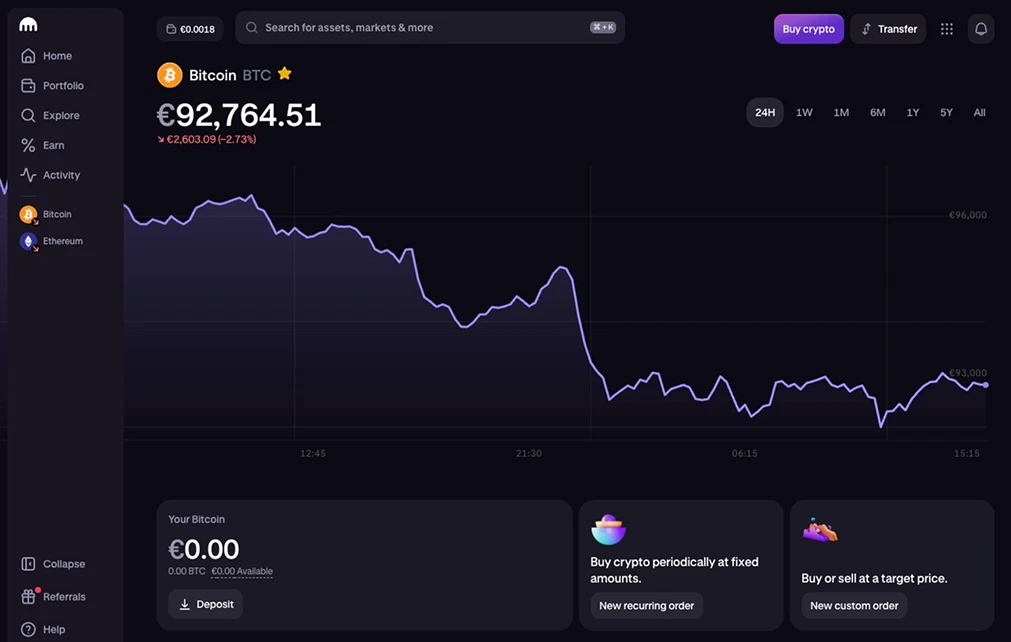
2. Bybit
Bybit has built a large following in Bulgaria for its derivatives and high-leverage products (up to 200×). Its platform lists more than 2,100 assets and provides liquid perpetual contracts, which attract more advanced traders. It has more than 75 million users and a daily trading volume of $50 billion.
The platform lists over 2,100 cryptocurrencies, making it one of the broadest selections. Beyond traditional spot and futures, Bybit’s product suite is expansive. Users can explore Copy Trading to replicate strategies from top performers, or use Trading Bots like Grid, DCA, and Futures Combo.
The Bybit Earn program provides flexible savings and staking yields, while the Bybit Card allows Bulgarians to spend crypto directly and earn cashback rewards. AI-driven insights through TradeGPT and access to the Web3 hub add another layer of innovation, especially for those interested in DeFi.
Platform Highlights:
- Fees: 0.1% for spot trading.
- Supported Assets: 2,100+ cryptocurrencies.
- Regulation & Licensing: Holds a MiCA license to operate across Europe.
- BGN Deposit Methods: Credit card, debit card, SEPA transfers, Apple Pay, Google Pay, Samsung Pay, Monobank (via P2P), Wise (via P2P).
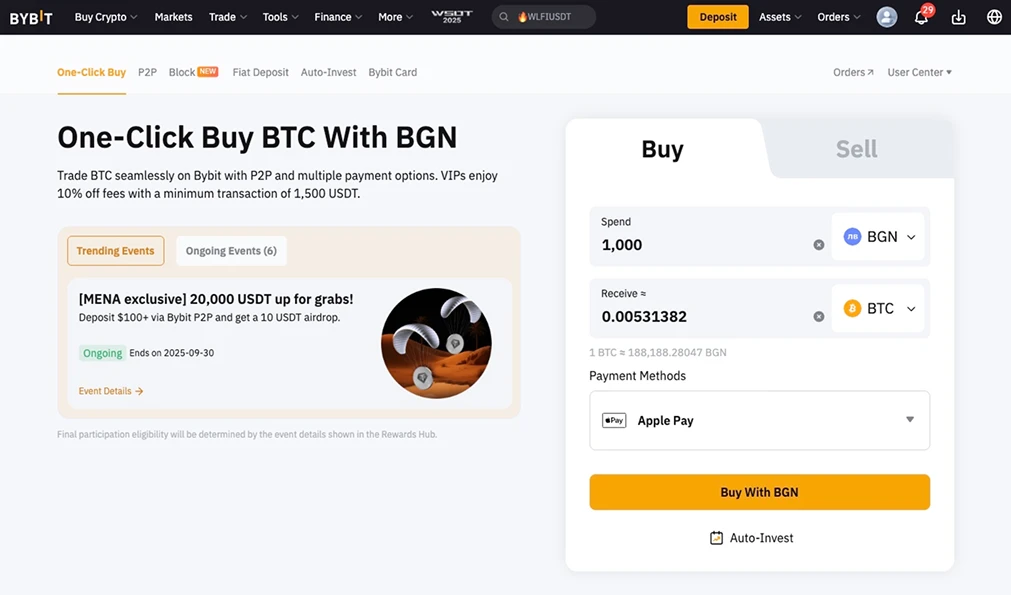
3. Binance
Binance is the world’s largest crypto exchange by trading volume and user base, with more than 270 million users across 180 countries. It provides unmatched liquidity across spot and derivatives markets, as well as a vast list of more than 500 assets for spot trading and 400+ futures contracts.
The platform’s services extend well beyond simple trading. Investors can use Binance Earn for savings, staking, and liquidity farming, or participate in Launchpool and Megadrop events to access new tokens. Its Copy Trading hub allows users to automatically follow high-performing traders.
Security and compliance remain central to Binance’s growth. The exchange publishes regular proof-of-reserves audits and maintains the Secure Asset Fund for Users (SAFU) as an emergency insurance pool. Its global footprint includes regulatory registrations across multiple EU countries.
Platform Highlights:
- Fees: 0.1% spot trading, with discounts for BNB token holders.
- Supported Assets: 500+ cryptocurrencies.
- Regulation & Licensing: Licensed in several EU states; aligning with MiCA for Bulgarian compliance.
- BGN Deposit Methods: SEPA transfers, credit card, debit card, Apple Pay, Google Pay.
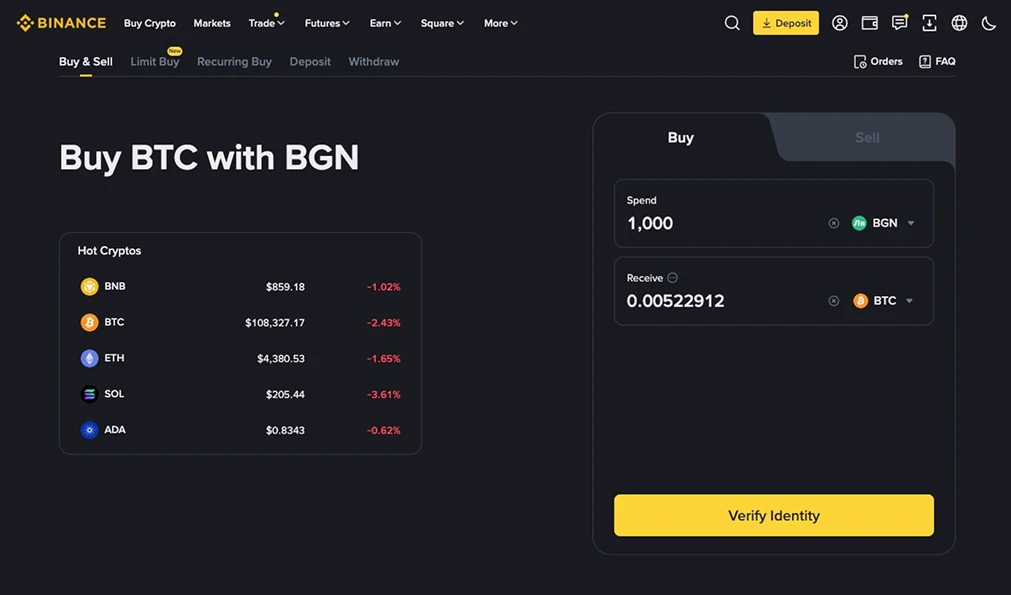
4. Bitpanda
Bitpanda, founded in Vienna in 2014, has expanded into one of Europe’s most versatile investment platforms. It is not just a crypto exchange but a multi-asset broker, offering access to more than 600 cryptocurrencies alongside 3,000+ stocks, commodities, ETFs, and precious metals.
Security and compliance are core to Bitpanda’s offering. The company is regulated in Austria, fully licensed across the EU, and ISO 27001 certified, ensuring the highest IT and data security standards. Assets are stored in offline wallets, meeting strict European AML and KYC requirements.
It also delivers Crypto Indices that allow one-click diversification, savings plans, the Bitpanda Crypto Card, and Bitpanda Spotlight, which highlights emerging digital assets. Additionally, educational tools like the Bitpanda Academy make it easier for new investors to build financial literacy.
Platform Highlights:
- Fees: 1.49% on crypto transactions.
- Supported Assets: 600+ cryptocurrencies, 3,000+ assets (stocks, ETFs, commodities, metals).
- Regulation & Licensing: Holds a MiCA license in Europe.
- BGN Deposit Methods: Bank transfer, SEPA, Apple Pay, PayPal, credit card, debit card.
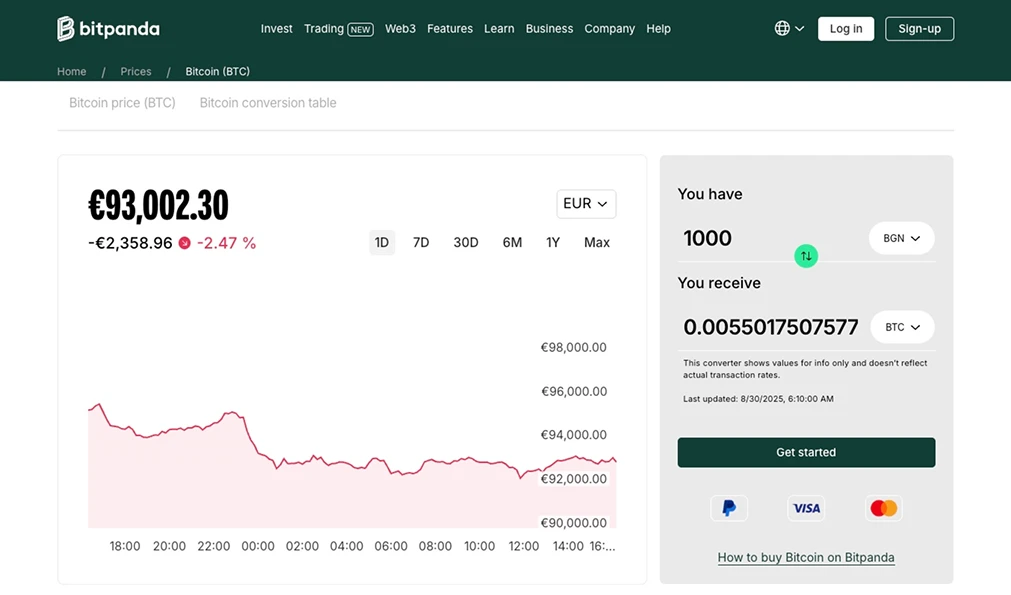
5. Coinbase
Coinbase is one of the most trusted names globally and the largest publicly traded crypto company, with a Nasdaq listing and over 100 million registered customers. Bulgarians use it for both retail-friendly instant buys and advanced charting through Coinbase Advanced.
The platform offers Coinbase Advanced which comes with professional-grade charting powered by TradingView, order types such as market, limit, and stop limit, and analytical indicators like RSI, EMA, and MACD. This makes it attractive to active traders who want deeper control over execution.
On the retail side, Coinbase provides a simple interface for instant crypto purchases and recurring buys, making it suitable for beginners as well. Coinbase also features staking products with annual rewards and premium services under Coinbase One, which includes zero trading fees.
Platform Highlights:
- Fees: 0.4% - 0.6% per trade; Coinbase One offers zero fees up to $10K monthly.
- Supported Assets: 200+ cryptocurrencies.
- Regulation & Licensing: Publicly listed in the U.S.; aligning with MiCA for Bulgaria.
- BGN Deposit Methods: Credit card, debit card.
.webp)
6. Uphold
Uphold is popular among new Bulgarian investors who want a transparent and easy-to-use platform. With support for 250+ cryptocurrencies, fiat currencies, and precious metals, it positions itself as a true multi-asset platform that makes onboarding easy for beginners.
The exchange supports staking on 20 digital assets with rewards of up to 16.7% APY. Users can stake and unstake instantly, giving them flexibility not often found on other platforms. Additional features include UpHODL, which automates long-term crypto investing, and the Uphold Crypto Mastercard.
Transparency is Uphold’s strongest selling point. It pioneered real-time proof-of-reserves, publishing its assets and liabilities every 30 seconds, ensuring holdings are fully backed. Security certifications including SOC 2 Type 2, ISO 27001, and PCI DSS ensure compliance with global standards.
Platform Highlights:
- Fees: Around 1.2% for crypto trades; spreads vary by asset.
- Supported Assets: 250+ cryptocurrencies, fiat pairs, metals.
- Regulation & Licensing: Holds a MiCA license across Europe.
- BGN Deposit Methods: Debit card, credit card, SEPA bank transfers, Apple Pay, Google Pay.

Is Cryptocurrency Regulated in Bulgaria?
Bulgaria’s regulatory landscape for cryptocurrencies has evolved significantly under the EU’s Markets in Crypto‑Assets (MiCA) framework, providing clarity and investor protection. MiCA became directly enforceable across the EU, including Bulgaria, from 30 December 2024, covering both token issuers and crypto-asset service providers (CASPs).
In response, Bulgaria enacted its own Markets in Crypto‑Assets Act, which was imposed on 20 June 2025 and officially published in the State Gazette in early July, empowering the Financial Supervision Commission (FSC) to license and supervise most crypto activities, while the Bulgarian National Bank (BNB) oversees issuers of e‑money tokens.
Under this act, crypto-assets are categorized into asset-referenced tokens, e-money tokens, and other crypto-assets, each subject to distinct disclosure and prudential requirements. A transitional period will extend until mid-2026, allowing existing providers to continue operations while applying for MiCA-compliant licenses.
How is Crypto Taxed in Bulgaria?
Bulgaria applies its standard tax framework to cryptocurrencies, meaning investors and businesses must follow the same rules that apply to other financial assets. The National Revenue Agency (NRA) provides oversight, and reporting obligations are strict.
Below are the main types of taxes that apply to crypto in Bulgaria:
- Personal Income Tax: Individuals pay a flat 10% income tax on profits from trading, selling, or exchanging cryptocurrencies. This includes both fiat conversions and crypto-to-crypto swaps.
- Corporate Tax: Companies engaging in cryptocurrency activities, such as trading or holding tokens on balance sheets, pay the standard 10% corporate income tax on their profits.
- Mining Income Tax: Mining is considered a business activity. Individual miners are subject to a 15% tax rate on income from mining, while corporate miners fall under the 10% corporate tax regime.
To remain compliant, investors must maintain detailed records of every transaction, including dates, amounts, market prices, and fees, and submit them in annual tax returns.
Cryptocurrency Adoption in Bulgaria
Bulgaria’s cryptocurrency market is entering a strong growth phase, supported by regulatory clarity under the EU’s MiCA framework and increasing investor participation.
User adoption is rising steadily. By 2026, the number of active participants is forecast to reach 826,000, representing 8.96% of the population in 2025 and climbing to 12.39% by 2026. This trajectory highlights Bulgaria’s shift from a niche investor base toward a broader audience.
Another unique driver of adoption is Bulgaria’s positioning as a hotspot for crypto mining. The country’s comparatively low energy costs and regulatory openness have made it attractive for mining operations, adding to its role in the regional digital asset economy.
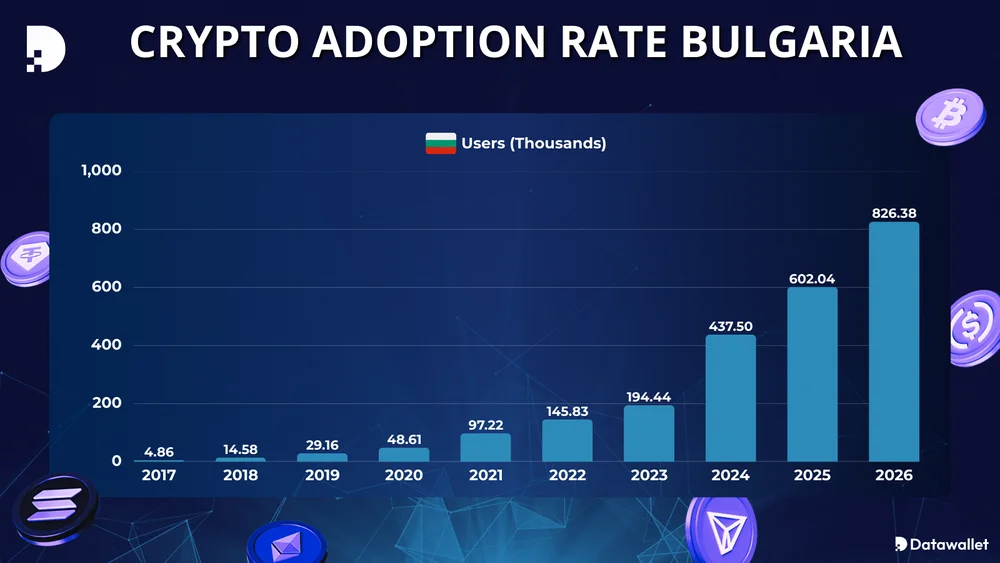
How to Buy Bitcoin in Bulgaria
Bulgarian residents seeking to purchase Bitcoin can benefit from a regulated environment overseen by the Financial Supervision Commission (FSC). Here’s a simple guide to getting started with BTC in Bulgaria:
- Select a Crypto Exchange: Choose a trusted exchange that supports Bulgarian users and allows deposits in BGN. Leading global platforms compliant with EU regulations, as well as licensed providers operating under FSC oversight, are available.
- Create Your Account: Sign up on the exchange and complete the Know Your Customer (KYC) requirements. Typically, you’ll be asked to upload a valid passport or national ID, and in some cases a Bulgarian residence document, such as a utility bill.
- Deposit Funds: Fund your account using supported payment methods. In Bulgaria, the most common options include local bank transfers in BGN, international card payments, and online banking integrations.
- Purchase Bitcoin (BTC): Once your funds are available, navigate to the Bitcoin trading section. Enter the amount you want to purchase, review the order details carefully, and confirm the transaction.
By following these steps, Bulgarian investors can securely acquire Bitcoin on exchanges operating under clear regulatory standards that prioritize investor protection, compliance, and transparent trading.
Final Thoughts
Bulgaria’s crypto market is moving quickly toward maturity, with MiCA bringing legal clarity and the FSC providing direct oversight.
For investors, the key is matching your goals with the right platform, whether that means using Kraken for depth of assets, Bybit for futures, Binance for copy trading, Bitpanda for multi-asset exposure, Coinbase for institutional tools, or Uphold for simple access. Choosing a licensed exchange that fits your strategy ensures you trade securely.
Frequently asked questions
Can Bulgarians use local bank transfers to fund crypto exchange accounts?
Yes. Most leading exchanges that operate in Bulgaria, such as Kraken, Binance, and Bitpanda, support deposits in Bulgarian Lev (BGN) through SEPA or direct bank transfers, making it simple for residents to move funds securely.
Is cryptocurrency legal to use for payments in Bulgaria?
While Bulgaria has no outright ban on using crypto for payments, digital assets are not recognized as legal tender. Businesses may choose to accept crypto, but transactions are still subject to tax reporting and oversight under EU financial rules.
Do Bulgarian crypto investors need to report holdings to the tax authorities?
Yes. The National Revenue Agency (NRA) requires Bulgarian residents to declare all gains from cryptocurrency trading, staking, or mining in their annual tax returns, even if profits were realized through foreign exchanges.
Which Bulgarian authority regulates crypto exchanges under MiCA?
The Financial Supervision Commission (FSC) is responsible for licensing and supervising crypto exchanges in Bulgaria under the EU’s Markets in Crypto-Assets (MiCA) framework, while the Bulgarian National Bank oversees e-money tokens.
%25201%2520(1).webp)
Written by
Emily Shin
Research Analyst
Emily is passionate about Web 3 and has dedicated her writing to exploring decentralized finance, NFTs, GameFi, and the broader crypto culture. She excels at breaking down the complexities of these cutting-edge technologies, providing readers with clear and insightful explanations of their transformative power.

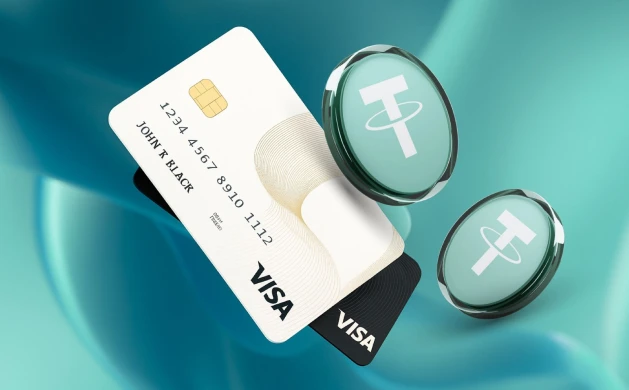
%2520(1).webp)
.webp)

.webp)




